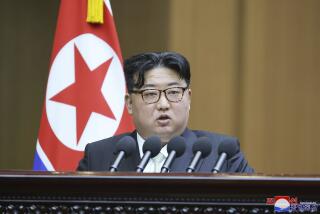Reunions Kindle Hope for More Dialogue
SEOUL — As TV cameras zoomed in to catch their every word, elderly Koreans traded half a century’s worth of endearments and recriminations at family reunions Sunday in the North Korean resort of Mount Kumgang.
“Mother! I can’t believe you are alive!” exclaimed a North Korean woman, Kim Young Hee, as she embraced the 81-year-old parent who she had thought was killed during the Korean War.
“What happened? Did you run off with your girlfriend?” demanded Jeong Gwi Yeop, 75, a South Korean woman berating a husband who disappeared in 1951. She was so angry that her wounds seemed as fresh as though they had been inflicted the day before.
Sunday’s reunions were the first to take place since February of last year and a hopeful sign that the two Koreas are restarting their dialogue. The leaders of the estranged countries pledged at a historic summit in 2000 to hold regular such reunions, but after three rounds, the agreement broke down amid bickering over timing and location. The North Koreans abruptly canceled a fourth round, which had been scheduled for October, complaining about security measures imposed in South Korea after Sept. 11.
North Korea eventually agreed to allow the weekend reunions to take place at Mount Kumgang, a tightly controlled tourist enclave, instead of in the capitals of Seoul and Pyongyang, where the earlier gatherings took place. For Sunday’s event, 99 elderly South Koreans selected by lottery from thousands of applicants got the opportunity to meet with 184 North Korean relatives. They will spend three days together, after which 100 North Koreans will have the chance to meet with 474 of their South Korean relatives, also at Mount Kumgang.
In what has become virtually the Korean version of reality programming, the reunions were broadcast live on South Korean cable television--affording the participants little privacy and giving viewers here a close-up of some wrenching emotional moments.
There was less joy than sorrow, as many relatives told one another about loved ones who had died. One North Korean woman, Lee Shin Ho, who had expected to meet her 93-year-old mother, learned instead that she had died Friday. A son fell to his knees, bowing to a father he had not seen since he was a baby. Elderly sisters sobbed and embraced as they recounted the heartbreak of the past.
“When shall we meet again?” asked Ju Oak Hee, 78, reunited with a sister she hadn’t seen in half a century and most likely won’t see again after this week.
North Korean leader Kim Jong Il agreed to resume the reunions during a summit this month with Lim Dong Won, a special envoy of the South Korean president. Also at that meeting, a deal was reached to resume work on road and rail lines between the Koreas, along with other kinds of economic cooperation. The Communist North, with its failing economy, is desperate for financial help from the prosperous South, and its latest concessions are widely viewed as bids for money.
Today, North Korea kicks off a two-month festival known as Arirang, which features mass gymnastics and parades in honor of the 90th birthday of the country’s late founder, Kim Il Sung.
Although the event was originally planned to bring in revenue from tourism, North Korea said at the last minute that it would not invite South Koreans--leaving events such as the highly restricted reunions at Mount Kumgang the only opportunity for ordinary people from the two halves of the peninsula to interact.
Many observers believe that the North Korean leadership is worried that its people might grow unruly if they become aware of the far greater wealth of South Korea. In the last few days, three North Koreans have defected to the South through embassies in Beijing--bringing to 162 the total number of North Korean defectors to arrive here this year.
The North Koreans also used the occasion of the reunions for a little propaganda pitch. Participants from the North wore Kim Il Sung buttons, and they took pains to dispel on camera their relatives’ worries about famines and hardships in North Korea.
“I grew up in the embrace of the great leader. I was well cared for and well educated,” a man in his 70s, Lee Kwang Chol, said sternly. His older sister from South Korea looked on skeptically.
More to Read
Sign up for Essential California
The most important California stories and recommendations in your inbox every morning.
You may occasionally receive promotional content from the Los Angeles Times.










